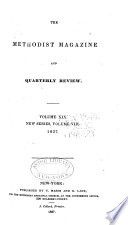 May we know what this new doctrine, whereof thou speakest, is? 20. For thou bringest certain strange things to our ears: we would know therefore what these things mean. 21. (For all the Athenians, and strangers which were there, spent their time in nothing... May we know what this new doctrine, whereof thou speakest, is? 20. For thou bringest certain strange things to our ears: we would know therefore what these things mean. 21. (For all the Athenians, and strangers which were there, spent their time in nothing...  The Quarterly Review - Page 2961856Full view The Quarterly Review - Page 2961856Full view - About this book
 | 1827 - 524 pages
...We would know therefore what these things mean. For all the Athenians and strangers which were there spent their time in nothing else, but either to tell or to hear some new thing. Then Paul stood in the midst of Mars-hill, and said ; Ye men of Athens, I perceive that... | |
 | Edward Young - 1828 - 126 pages
...would therefore know what these things mean. (For all the Athenians and strangers which were there, spent their time in nothing else, but either to tell or to hear some new thing.)" It is worth while to observe, that the historian, who inserts no parenthetical remarks... | |
 | 1828 - 828 pages
...know, therefore, what these things mean. 21 (For all the Athenians, and strangers which were there, spent their time in nothing else, but either to tell or to hear some new thing.) t« Ч Then Paul »tood in the midst of Man-hill, and said, Ye men of Athens, I perceive... | |
 | Samuel Whelpley - History - 1828 - 526 pages
...curiosity. This account is corroborated by Luke : " All the Athenians and strangers who were there, spent their time in nothing else, but either to tell or to hear some new thing.',' It is said, there were more images in Athens, than in all "Greece besides, and that they... | |
 | Timothy Kenrick - Bible - 1828 - 332 pages
...know, therefore, what these things mean. 21. For all the Athenians and strangers which were there, spent their time in nothing else, but either to tell or to hear some new thing. Areopagus was a building at Athens, in which a court, called the court of Areopagus, was... | |
 | Charles James Blomfield - Bible - 1828 - 416 pages
...adds the historian, as a reason of their proceeding, all the Athenians and strangers which were there spent their time in nothing else, but either to tell or to hear something new. St. Paul, thus called upon to declare the principles of true religion, before an assembly... | |
 | 1829 - 446 pages
...giving ear to fables." They were no wiser in the days of St. Paul, who tells us, " That the Athenians spent their time in nothing else but either to tell or to hear some new thing." According to the accounts of travellers, they are still of the same disposition. THE DOMESTIC... | |
 | Richard Baxter - 1830 - 544 pages
...and care. It was the vice of the Athenians, " for' all the Athenians and strangers that were there, spent their time in nothing else but either to tell or to hear some new thing" (Acts xvii. 2 1) ; yea, novelty of doctrine and religion, and teachers, is a snare and bait... | |
 | Methodist Church - 1837 - 504 pages
..." and brought him unto Areopagus," he says, " For all the Athenians and strangers which were there spent their time in nothing else, but either to tell or to hear some new thing." Here we have a clew to the object of the scene. Not only the Athenians, but the numerous... | |
 | Daniel Appleton White - Lyceums - 1830 - 72 pages
...intellectual being ; at the best, never rising above that of the idlers whom Paul found at Athens, " who spent their time in nothing else, but either to tell or to hear some new thing." But the pleasures, which flow from the pursuit and acquisition of real knowledge, and the... | |
| |